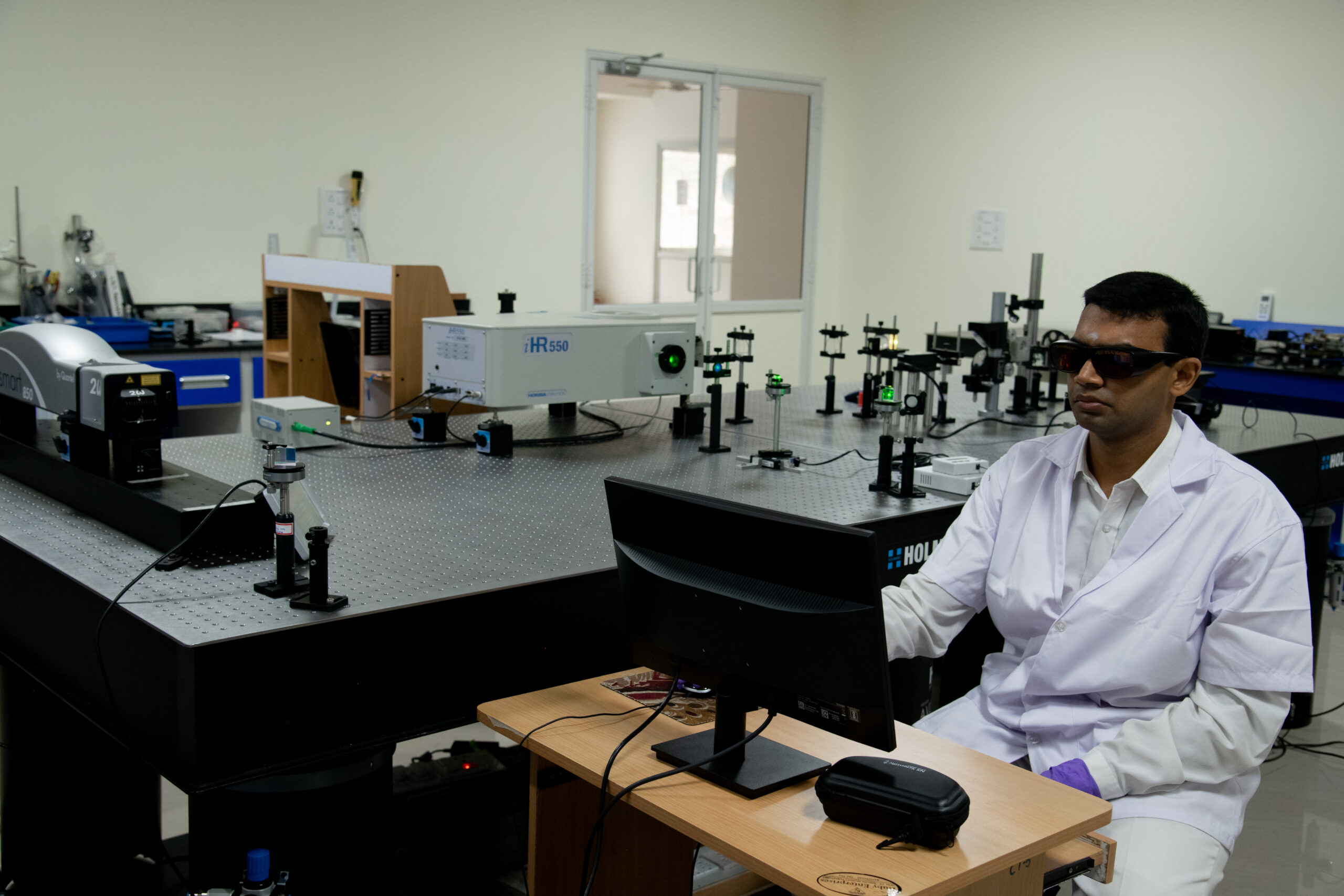Professional Programme
For Men

Duration: 2 Years
What are the technologies that harness the power of light? How does a WhatsApp video sent from thousands of kilometres away reach you in a fraction of a second? Can your data travel at the speed of light? Can you send light to a ‘conductor’ like an electric current? If yes, what electronic devices generate, detect, and control it?
The answer is Optoelectronics and Communications. As electronics did in the 20th century, this set of revolutionary technologies will have a unique impact on human progress in the 21st century.
This interdisciplinary program seeks to develop skilled professionals in the expansive fields of Optoelectronics and Communications, focusing on Optical Communications, Optical Networking, Signal Processing, Very Large Scale Integration (VLSI) technologies, Computer Programming, and Automation.
Students can design, construct and use optoelectronic devices for sensor applications. They will also get hands-on experience with optical fibers and fiber-based components. They will become proficient in building and analyzing computer networks and Optical Networking technologies.
STRUCTURE
One-half of the courses are core papers, and the other half are electives, enabling students to pursue their academic interests.
The core courses provide a strong foundation in science and engineering. They are supplemented by laboratory courses, which allow students to take on project work in the second year. This training makes them highly compatible and ubiquitous in leading industries and R&D organizations worldwide.
The electives help students tailor their programme according to their interests and skills. They can select any five electives from diverse streams (refer to the list of courses).
In Year 1, in the second semester, students must complete a mini-project.
In Year 2, students pursue a full-term, industry-mentored project, working with mentors from leading Networking, Communications and Semiconductor industries. This project provides students with the ultimate training to apply the technologies they learn and serves as a heads-up to meet industry requirements.
At the end of each semester, every student will undergo a credited Viva Voce conducted by a panel of faculty members to help them prepare for technical interviews.
CAREER OPTIONS
The programme equips students for careers in telecommunications, fiber optics, photonics, and optoelectronic devices, enabling them to contribute to the advancement of essential technologies used in fields such as medicine, defense, manufacturing, communication networks, and renewable energy.
In a broader sense, they will be equipped to grasp how engineering solutions affect contemporary global economic, environmental, and societal contexts for sustainable development.
INTERNSHIP
Students are encouraged to undertake an Industry Internship for a minimum period of 2 months and maximum of 6 months after the first year of study.
All India Council for Technical Education (AICTE) approved programme.
- The candidate must have either passed or appeared for final exams of one of the following:
M.Sc. in Physics or B.E. / B.Tech. in Electronics and Communications engineering (ECE) / Electrical & Electronics Engineering (EEE) / Electronics and Instrumentation Engineering (EIE) - Candidates with valid a GATE/CSIR/JEST score in relevant fields can appear directly for the second round of the admissions process – Technical Viva Voce Round
- Age: preferably below 28 years on 30th June in the year of admission
YEAR 1
Semester 1
Optoelectronics and Optoelectronic Sensors
Digital Communication Systems
Broadband Communication Networks
Elective – I
Optoelectronics Lab
Fiber Optic Components Lab
Algorithm Development Lab
Awareness Course I: Fundamentals of Indian Culture
Semester 2
Optical Communication Systems
Optical Networks
Elective – II
Elective – III
Entrepreneurship and Innovation
Network Lab
Automation Lab
Mini Project
Awareness Course II: Sources of Values
YEAR 2
Semester 3
Elective – IV
Elective – V
Network Security Lab
Project Work
Awareness Course III: Work Culture, Ethics and Values
Semester 4
Project Work
Awareness Course IV: SSSIHL’s Core Values and Philosophy
Electives
Stream I: Optoelectronics
- Principles of Photonics
- Optical Instrumentation
- Integrated Optics
- Biomedical Optics
- Biophotonics
Stream II: Networking and Communications
- IoT and Sensor Networks
- Network Security
- Wireless Communication Networks
- AI & ML in Cyber Security
Stream III: Very Large Scale Integration (VLSI) Technology
- Principles of VLSI
- VLSI Design & Test
- FPGA Based Design
- Embedded Systems and RTOS
- ASIC Design
- Digital Logic Design
Stream IV: Robotic Technologies
- Embedded Signal Processing
- Adaptive Signal Processing
- Image Processing and Computer Vision
- Robotic Instrumentation and Sensors
- Robot Programming
- Fundamentals of AI for Robotics
OPEN ELECTIVES
- Introduction to Virtualization Technologies
- Software Engineering
- Microfluidics: Devices and Applications
- Biomedical Signal Processing
- Data Structures and Algorithms
- Computer Organization and Architecture
- Basics of Managing a Business

